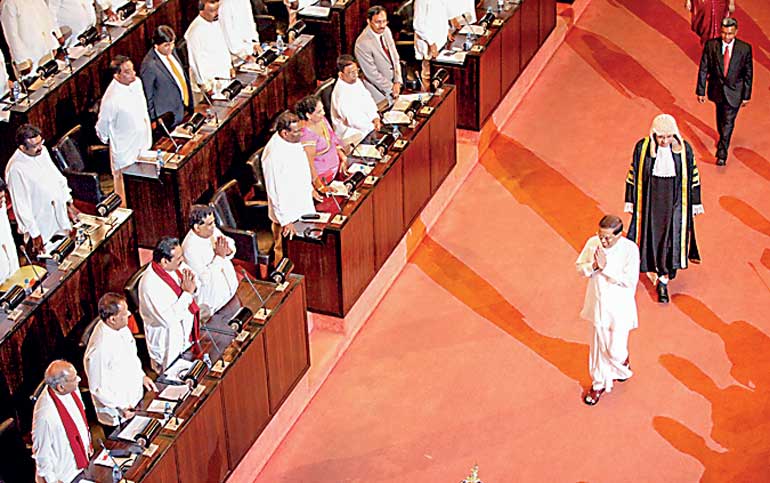Wednesday Feb 18, 2026
Wednesday Feb 18, 2026
Wednesday, 2 September 2015 00:01 - - {{hitsCtrl.values.hits}}

President Maithripala Sirsena greets former President Mahinda Rajapaksa as he is led to deliver the inaugural address to the House yesterday after the latter took oaths as a Member of Parliament
By Uditha Jayasinghe 
A tough-talking President Maithripala Sirisena laid out his wish list before the new Parliament yesterday calling on the members to work towards reconciliation and development while backing the anticorruption fight.
Keeping to his forthright demeanour, the President thanked all those who did and did not vote him into power in January before outlining the challenges before the new set of lawmakers. Setting the tone right at the start of the address by putting national security at the top of his agenda, the President called on the Parliament to support him as the Defence Minister, putting aside all other considerations.
Shifting Sri Lanka away from international scrutiny over its human rights record remains a priority of the Government, President Sirisena stated, adding that he would follow a non-aligned foreign policy centred on Asia.
“I welcome all Sri Lankan people overseas to come and participate in the development of this country. I stand ready to give them a red carpet welcome and will establish a special task force to oversee assistance extended by intellectuals and professionals.
“I reiterate my pledge to wipe out corruption and will continue investigations and bring all offenders before the law irrespective of their status,” the President said to applause from the Well. National policies that will not be changed from government to government will also be established during this term, he said.
Pointing out that Parliament had to meet the future expectations of the Sri Lankan people, the President called the members to back his efforts to create a new political career dominated by integrity, humility and discipline that would lead to the creation of a modern Sri Lankan State.
“There have been many examples from around the world of national or consensual governments. After the end of apartheid, South Africa created a National Government to move the country forward. The ideal time to create a National Government would have been after the war. But we missed that opportunity. Even at this late point I have seen the need to create a National Government,” he told Parliament.
Despite Sri Lanka having three Constitutions since independence, it has been unable to formulate one which all nationalities can agree upon, the President noted, adding that it was time to address these shortcomings.
“All of you must decide if the executive presidency is needed or not and if it is necessary then what form it should take. This House must also shoulder the responsibility of election reforms that were suspended and build an inclusive platform to represent all ethnicities.”
Sirisena urged the Parliament to work to bridge the development gap between its Asian neighbours calling for a concentration on human resource to spearhead growth. Skills development will get renewed focus under the new government, he stressed. Sri Lanka can leverage on its geographical location to push forward growth, the president advocated, adding that more attention needed to be paid to the informal economy as it included the self-employed.
He also urged Parliament to formulate policy to link farmers and small businesses to the national economy and outlined intentions to promote import substitution. He also pledged to improve food security, infuse technology into agriculture and draft policies to improve the quality of food available to consumers.
Increasing per capita income should be balanced with reducing income inequalities, he went onto say, pointing out that economic development should not come at the cost of the environment.
While investing more in health, education and transport, the President also agreed to give priority to public servants, reduce salary anomalies and include them in the development process. Vulnerable groups such as women, children and the differently-abled would be a focal point of new policies.
“The foundation has been created for a new political culture and it is the task of these members to work for the upliftment of Sri Lanka and her people so that they may occupy their rightful place in the world.”